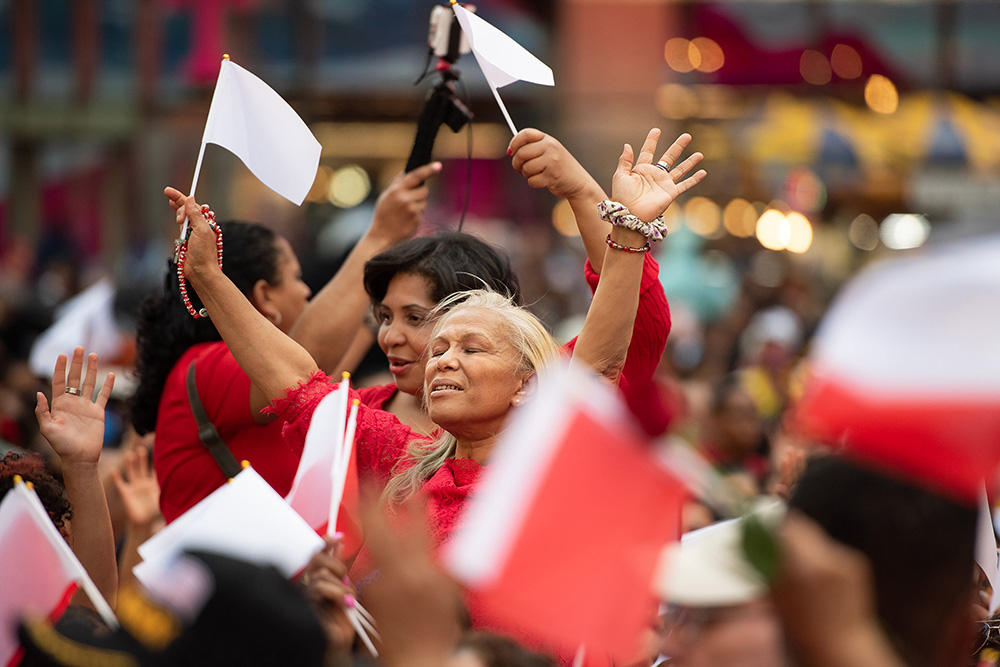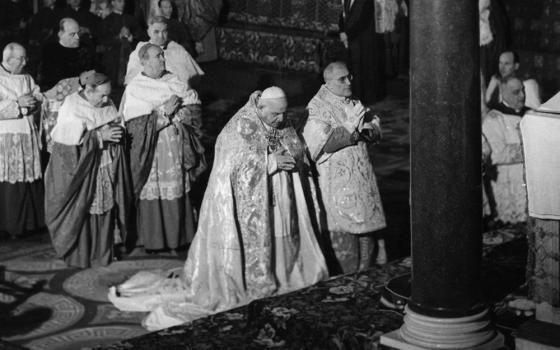
A woman prays during a eucharistic procession through the Manhattan borough of New York City to St. Patrick's Cathedral for a Pentecost Vigil May 27, 2023. (OSV News/Jeffrey Bruno)
We're celebrating one of the greatest feasts of the church year and all we have for evidence of it is a short account from the beginning of the Acts of the Apostles, also called the second volume of the Gospel of Luke. Since the story is so short, we should look very carefully at what Luke wrote, assuming that he meant this brief narrative to tell us much more than we might expect.
He begins, "When the time for Pentecost was fulfilled." That indicates that Pentecost, a word that comes from a Greek expression referring to the 50th day, is not originally a Christian feast. For the Jewish people, this feast commemorates the time when God gave Moses the Law, the greatest expression of God's deepest connection to humankind. Thus, celebrating Pentecost indicates that we are living in the fulfillment of that living relationship.
The allusions to Jesus' Jewish tradition continue in many of the details of the story.
When Moses went up the mountain, the entire people were gathered below waiting for what he could tell them of God and God's will. Luke tells us that, on the Christian Pentecost, "they were all in one place," but he doesn't tell what they were waiting for.
The sound like a great wind recalls the noise the people heard when Moses met with God on Mount Sinai (Exodus 19-20). The immensity of that moment with wind and tremendous thunder-like sounds is reinterpreted in the Christian Scripture where it is more inspiring than frightening.
Luke tells us that the Pentecost time of remembering God's law was "fulfilled." That word, sumpleroo, speaks of completion, the achievement of all that the law was meant to be. Something new is afoot. This sumpleroo "filled the house," it became the disciples' new way of dwelling together, there was a new atmosphere among them.
The "tongues as of fire," recall John the Baptist's proclamation that the one to come would baptize them not with water, but with fire.
The essence of the experience was that they were filled with the Holy Spirit. Their relationship with God had gone beyond dialogue and commandments and became indwelling. The disciples' ability to speak in other languages, their preaching, everything that would result from their discipleship, rested on that one reality: They were filled with the Holy Spirit.
Today's other readings and the sequence comment on this event. In the Psalm, we beg for the experience of God's indwelling that renews our Earth. St. Paul's message to the Corinthians explains that because the gifts of God are too much for any one person to receive, they can only be experienced in community, where the diversity of people (cultures, languages, experience, viewpoints) can begin to express who God is.
Writing to the Romans, Paul describes his mystical vision of the Spirit dwelling in us and creating us anew, not as mere mortals, but as people of the Resurrection. That is exactly what we ask for in the sequence: "Come Holy Spirit ... shed your light, fill our inmost being."
Advertisement
John's Gospel brings us back to the end of the day of the Resurrection. Jesus overcomes all barriers, offering peace instead of fear to his beloved disciples. That lack of fear and awareness of God in them was all they needed to carry forth Jesus' mission — until the end of time. The sign that best expresses it was the forgiveness of sins.
The message the disciples were to carry forward proclaimed that no one need be tied to their past, whether it is a past of oppression like that of the people enslaved in Egypt or being defined by their worst moments instead of their potential. Forgiveness ushers everyone into the realm of God's future, far beyond any sad or sinful past.
Pentecost completes our celebration of Easter. Today, we remember each moment in which we have felt the influence of God's Spirit. Before you say that it's beyond you, the very fact that you are reading the Scriptures and reflecting on them demonstrates that the Spirit is leading you toward something deeper than you yet know.
Paul said that there are many kinds of gifts. We ought not disparage the Spirit's influence in our lives just because tongues of fire haven't brightened our way or we have trouble with other languages or even our own words. The marvels we read about are nothing more than that, signs and symbols of what the Spirit is constantly working in the world.
Today's feast reminds us that God not only chose to dwell among us, but to dwell in us. That mutual indwelling grows for a lifetime. It fulfills every human life.







